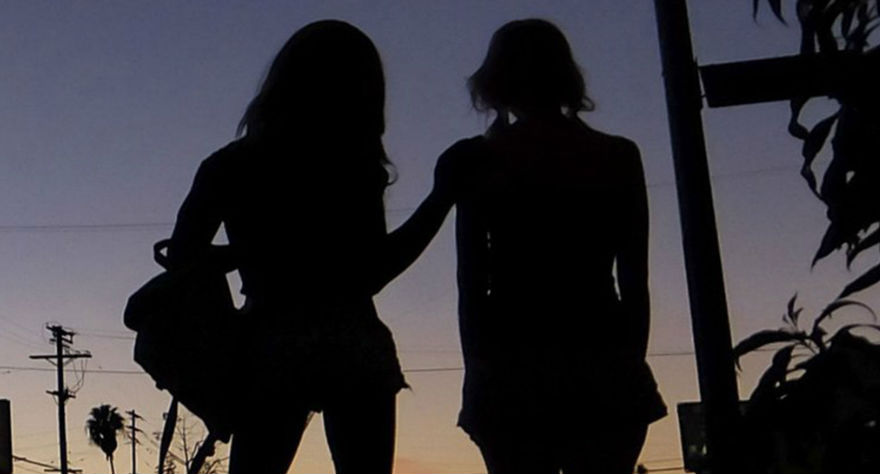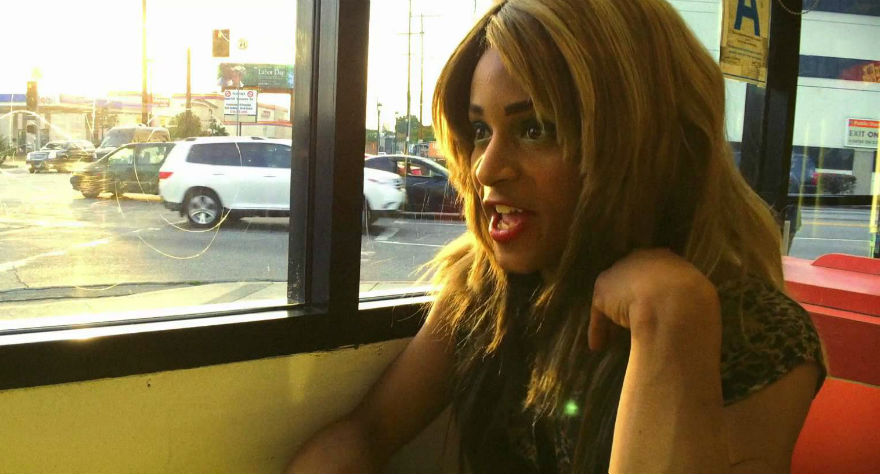
Look past the frenzied, sun-kissed surface, and you'll find a surprisingly humanist core.

Look past the frenzied, sun-kissed surface, and you'll find a surprisingly humanist core.
Sean Baker is a filmmaker who tends to focus on fringe characters, the kinds of people existing on the outer edges of what’s considered normal or beneficial to society. His previous film, the highly underrated Starlet, looked at an unlikely friendship between a young porn star and an elderly widow. One character was an outcast because of her career, while the other was tossed aside for outliving their usefulness, but Baker made this odd couple pairing work by focusing on the characters first (Baker doesn’t even reveal the pornography aspect of the film until halfway through).
Tangerine is, in many ways, a different beast from Starlet: more brash, intense, saturated, kinetic and uncompromising (just to name a few of the many adjectives that can get thrown this film’s way). But look through the hyperactive, sun-kissed surface and both films have the same, humanist centre.
The friendship here is between Sin-Dee (Kitana Kiki Rodriguez) and Alexandra (Mya Taylor), two transgender prostitutes barely scraping by in Los Angeles. They’re both sharp-witted, uncompromising people, although Alexandra would be considered the more low-key personality. Sin-Dee is like a tornado of aggression, the kind of person who gets their way by shouting down anything in opposition, and Tangerine takes a similarly no-nonsense approach to its storytelling. It takes less than 2 minutes for the plot to get introduced and set in motion; after getting out of jail on Christmas Eve, Alexandra tells Sin-Dee over a donut that her boyfriend/pimp Chester (James Ransome) has been cheating on her with cis female prostitute Dinah (Mickey O’Hagan), prompting Sin-Dee to walk the streets in search for her cheating boyfriend and the “fish” he’s sleeping with.
Once Sin-Dee stomps out of the donut shop (a location that Baker and co-writer Chris Bergoch cleverly return to at the end, a move that gives the film a nice, balanced structure amidst the chaos), the camera whirls around her and the soundtrack starts blasting. It feels like Sin-Dee taking over the film herself, and Baker letting viewers know what to expect: this is the kind of film you have to submit yourself to. Baker makes sure the pacing stays relentless, but he also breaks the narrative off into two other strands beyond Sin-Dee’s crazed campaign of fury.
The first of these follows Alexandra (who bails out on helping Sin-Dee once her promise of “no drama” gets shoved out the window) as she wanders the city, trying to earn some cash and get people to see her perform a musical number at a club later that night. The other story, and by far the calmest of the three, focuses on taxi driver Razmik (Karren Karagulian), a husband and father whose ties to Sin-Dee and Alexandra aren’t revealed immediately.

The three-pronged structure helps Tangerine from becoming too overwhelming, but by letting these characters go off on their own, it also helps define them as individuals. Rodriguez, Taylor and Karagulian are all excellent, taking Baker and Bergoch’s script and inhabiting their roles to the point where it feels like the screenplay was written around their personalities. And the cinematography by Baker and Radium Cheung—if you didn’t know already, Tangerine was shot entirely on iPhones, a fact that thankfully hasn’t been overshadowing the film itself—lets all the craziness unfold with a realism that highlights a character like Sin-Dee’s authenticity rather than indulging in her boisterous behaviour. The cinematography also helps establish subtle stylistic differences between each person: Sin-Dee’s story has the camera practically bouncing off the walls, Alexandra’s sees the camera calming down (Alexandra isn’t afraid to be like Sin-Dee if she has to be), and Razmik’s story finds the camera stuck in the tiny space of his cab for the most part.
But the decision to split things up also has its downsides. It’s quite easy to pick out the weak link, and here it’s Razmik’s storyline that can act as dead weight, even though Baker clearly intends for it to act as more of a counterweight. Razmik’s more conventional life, with a wife, daughter and a family dinner on Christmas Eve, acts as a contrast to Sin-Dee and Alexandra’s existence of living from John to John, but Razmik’s secret desire for transgender prostitutes lets Baker delve into the performative aspects of the characters. Yes, Sin-Dee and Alexandra’s exaggerative personas can make them feel like they’re playing a role, but it’s a role they choose to play, whereas Yazmik’s family man persona is a role he feels like he’s supposed to play. Baker communicates these ideas once the climax ties all three narrative strands together, but by tying it to a story that feels, in comparison to the other two, rather dull and shoehorned in, the themes fail to resonate as much as they should.
I’m disappointed that Tangerine didn’t work for me as much as Starlet did. What I found so refreshing about Baker’s last film was the humanism at its core, and while Tangerine has the same qualities, they feel drowned out from the style. It’s not that Tangerine is a bad film (read this rating as more of a recommendation with some reservations); it’s funny, energetic and cements Baker as a vital force in American independent cinema. But I also found its conclusion—a quiet, shared moment between Sin-Dee and Alexandra emphasizing their strong bond—somewhat unearned. I wish Tangerine had more moments like it throughout, rather than just at the end.
Tangerine is currently playing in select theaters across the US and Canada.